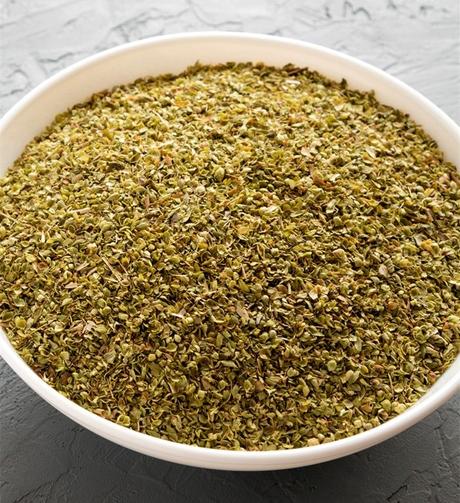
Poultry seasoning is a mix of aromatic and savory herbs and spices like black pepper, marjoram, nutmeg, sage, and thyme that deliver a strong peppery and lemony taste and aroma. It is commonly used as a rub for chicken, turkey, veal, lamb, pork, and white meat of upland game birds and is also used as a seasoning for stuffings, dressings, casseroles, herb sauces, bread, meatloaf, and more.
This versatile seasoning mix has a unique flavor profile that can be hard to replicate. But, you can get a close enough match with these poultry seasoning substitutes to create a mouthwateringly delicious meal.
1. Herbs de Provence
Herbs de Provence is a summery blend of herbs that includes marjoram, thyme, and rosemary - these are all ingredients commonly found in poultry seasoning blends. While it may contain oregano and spices that differ from those used in the original ingredient, it will still be a good substitute.
This spice rack staple can be used in place of poultry seasoning in fish and poultry recipes. Keep in mind that Herbs de Provence doesn't include sage, which is an important ingredient for seasoning chicken, so you might want to consider adding it to get the classic poultry seasoning flavor profile.
1 teaspoon poultry seasoning = 1 teaspoon Herbs de Provence.
2. Oregano
Oregano is one of the most common herbs in the kitchen. It has a pungent, earthy, and slightly minty aroma. While it's not a traditional ingredient in poultry seasoning, it goes great with chicken or turkey, which makes it work as a good stand-in.
You can add oregano to many recipes that call for poultry seasoning to give your food a well-rounded flavor and aroma. Keep in mind that oregano has a strong flavor, so start with a small amount and adjust to taste to avoid overpowering the delicate flavors of other ingredients in the dish. You may also add some thyme to the dish to get a flavor profile that's comparable to poultry seasoning.
1 teaspoon poultry seasoning = 1/3 teaspoon oregano.
3. Italian Seasoning
Italian seasoning has a slightly zesty and earthy taste. However, because it is made up of herbs like thyme, marjoram, and rosemary, which are commonly found in poultry seasoning, it has a flavor that is comparable to poultry seasoning and will work well with poultry recipes.
You can use Italian seasoning in meatloaves, pasta dishes, and marinades to infuse your dish with rich flavors. Keep in mind that Italian seasoning does not contain sage, so you may want to add some to your recipe to achieve a more similar flavor to the classic poultry seasoning blend.
1 teaspoon poultry seasoning = 1 teaspoon Italian seasoning. (Adjust the quantity based on the recipe you're making to enjoy a near-identical flavor profile.)
4. Za'atar
Za'atar is a popular Middle Eastern spice blend that includes dried herbs and earthy spices such as marjoram, oregano, thyme, cumin, coriander, sesame seeds, sumac, and salt. It has a nutty, aromatic, well-rounded flavor that goes well with most recipes that call for poultry seasoning.
Because the two blends have similar ingredients, za'atar can be used as a stand-in for poultry seasoning in savory recipes in a pinch. However, because it contains sumac, it will add an unexpected tanginess to the dish. It's best to use za'atar in rubs and marinades, where it shines the brightest.
1 teaspoon poultry seasoning = 1 teaspoon za'atar. (Adjust the quantity as per your recipe.)
5. Rosemary
Rosemary is an aromatic woody herb with a slightly bitter and earthy flavor. Since it's an ingredient in poultry seasoning, rosemary can work as a stand-in for the original ingredient, although it tastes quite different on its own.
Rosemary has a strong aroma and pungent taste, but it won't overpower the other ingredients in your dishes. It will also not give your dish the full flavor of poultry seasoning because it lacks the other elements. You can, however, blend it with other herbs to enjoy a similar flavor or with salt and pepper to add a pleasant taste to your turkey and chicken dishes.
1 teaspoon poultry seasoning = 1/2 teaspoon rosemary.
6. Thyme
Thyme, a staple ingredient, has a minty and sharp flavor. It's one of the key ingredients in chicken seasoning and thus can be substituted for the original ingredient in a variety of recipes that call for it.
The unique flavor and aroma of thyme blend well with ingredients like rosemary, garlic, and nutmeg. While it will not imitate the taste of the original ingredient in its entirety, it will add a light mint aroma to dishes to elevate their appeal without overpowering the other ingredients.
1 teaspoon poultry seasoning = 1/3 teaspoon thyme.
7. Marjoram
Marjoram, a member of the mint family, has complicated flavor notes and comes in two forms - fresh and dry. It's a herb that's found in poultry seasoning and works well in chicken, turkey, stuffing, and other recipes that call for poultry seasoning.
When used as a substitute for poultry seasoning, marjoram will bring a similar taste and smell to your dish. It can also be used with sage, nutmeg, and garlic to give your dish a more rounded flavor without overpowering the other ingredients. And if you're using fresh marjoram, make sure to add it towards the end of your cooking to retain its delicate flavors.
1 teaspoon poultry seasoning = 1/3 teaspoon marjoram.
8. Make Your Own
If you've tried different substitutes and weren't satisfied with the flavor they provided to your dish, why not try your hand at making your own poultry seasoning blend?
Use this recipe to make a homemade blend, then add it to chicken or turkey recipes, Thanksgiving-themed stuffings or casseroles, or your favorite soups to add delicious flavors. It will help you create a flavor profile that shares near likeness to the pre-mixed blend.
1 teaspoon poultry seasoning = 1 teaspoon homemade poultry seasoning.
